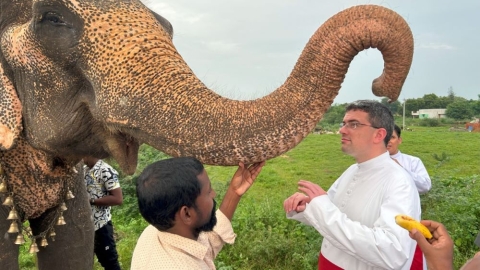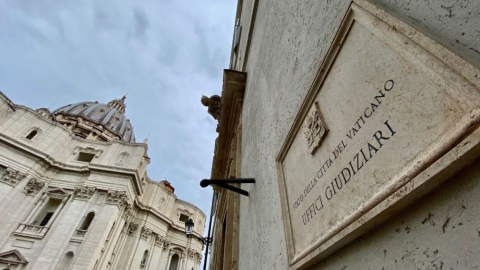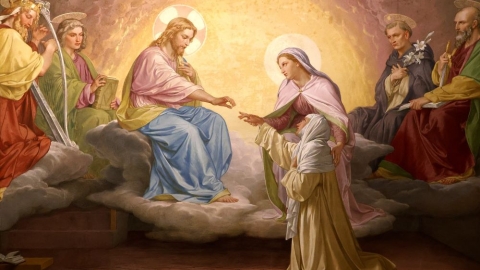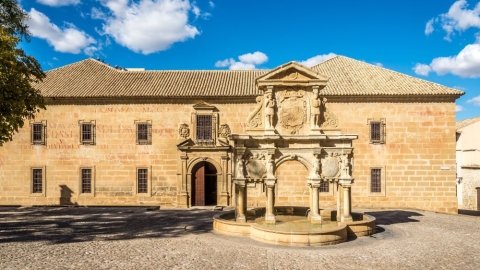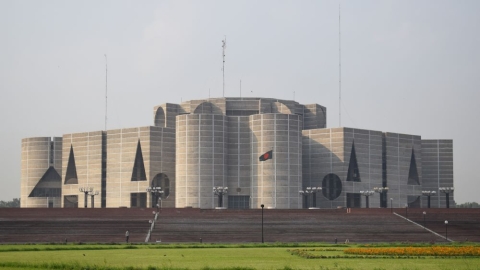The Chaplain of the United Nations?
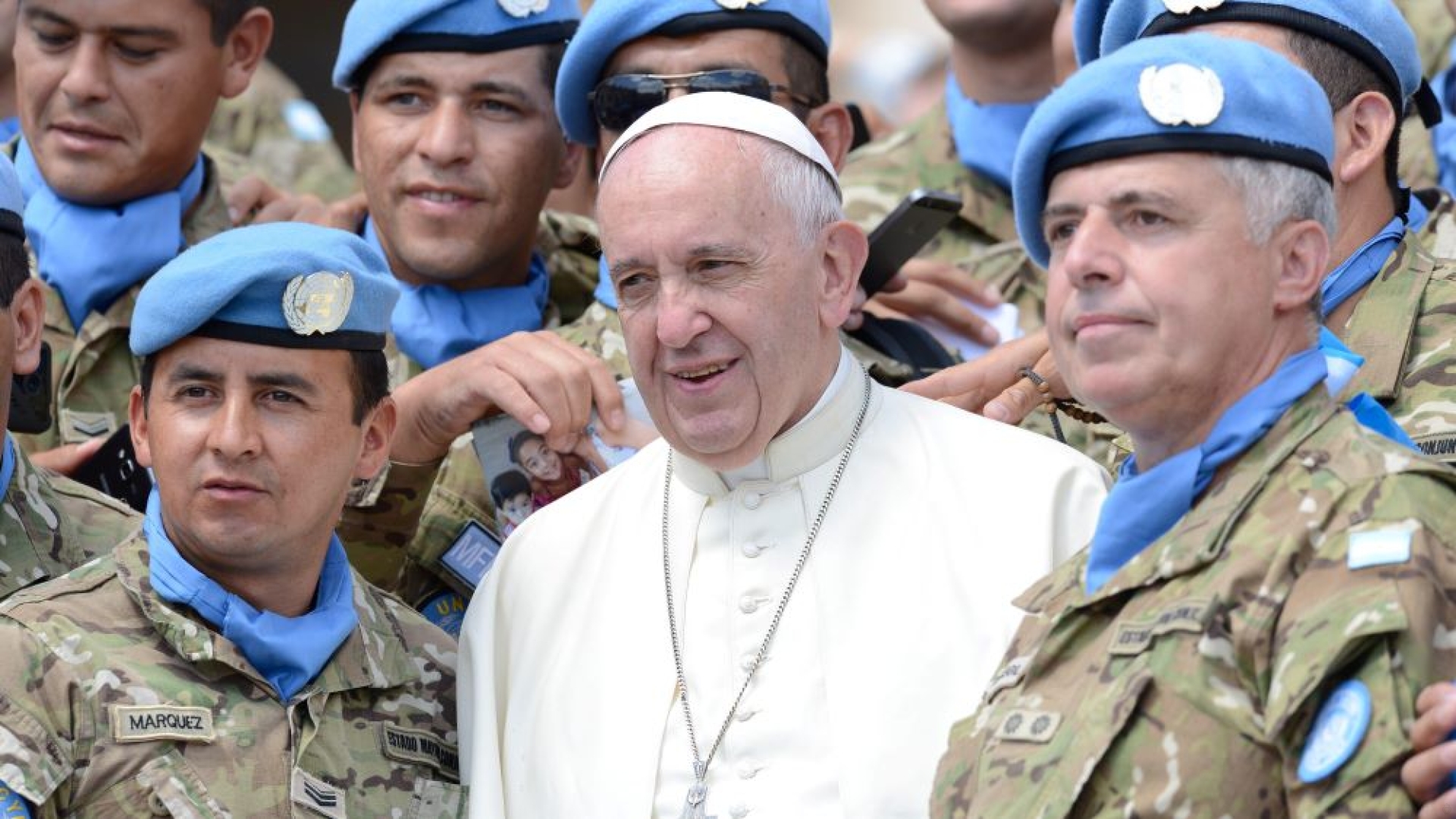
Each month, Pope Francis presents his “prayer intention” in a video. For January, this intention is to be “at the service of human fraternity,” in the direct line of Fratelli tutti (October 3, 2020) and of the Document on Human Fraternity of Abu Dhabi (February 4, 2019).
On her blog post of January 7, 2021, Jeanne Smits presented this video: “We thus see a woman who piously recites her rosary. Without transition, we pass to a veiled young Muslim woman who performs her ritual prayer on a carpet; seconds later, it’s a Jew’s turn to sway, skullcap on head and tallit—ritual shawl—on his shoulders.
“The three ‘prayers’ then send (to each other, no doubt) a prayer-emoticon from their cellphones and meet again shortly after, masked, to serve a soup kitchen (apparently vegetarian, made up of hot chickpeas!) to destitutes of the Caucasian type.
“The idea? Having each prayed to this God who makes us all 'brothers and sisters,' the protagonists of the video are ready for a charity which they will dispense together and without distinction of faith or of persons. From there to understanding that they worship the same God, who animates them with the same brotherly love, there is only one step that the video seeks to take its audience.”
The Explanation Given by the Pope
Moreover, the Pope’s voice over is heard to explicitly give the meaning sought by this video montage: “When we pray to God following Jesus, we come together as brothers and sisters with those who pray according to other cultures, other traditions, and other beliefs. We are brothers and sisters who pray. Fraternity leads us to open ourselves to the Father of all and to see in the other a brother or sister, to share our lives, to support, to love, and to know each other.”
Not once is it remembered that we are brothers by baptism, according to the teaching of St. Paul: “there is only one Lord, one faith, one baptism” (Eph 4:5). On the contrary, the voice of the pope affirms: “the Church values God’s action in other religions”; in other words: God acts in other religions, through them, by wanting their diversity as it is spelled out in the Abu Dhabi declaration.
The Pope adds: “Without forgetting that for us Christians, the wellspring of human dignity and fraternity is in the Gospel of Jesus Christ.”; but he continues, “We believers must return to our sources and concentrate on what is essential. What is essential to our faith is the adoration of God and love of neighbor.”
Are these Catholic believers? No, because while the Pope says these words, the video shows the young Muslim woman folding her prayer rug, reading her message, and placing her phone near the Koran; then it is the Jew’s turn to receive the SMS, after which the three—including the Christian—meet at their rendezvous to set up their soup kitchen.
And Francis concludes: “Let us pray that the Lord may give us the grace to live in full fellowship with our brothers and sisters of other religions and not fight each other, and praying for one another, open ourselves to all.”
The Meaning of the Pope’s Mission According to Fr. Fornos
J. Smits quite rightly recalls that “the Pope is or should be par excellence the one who strengthens us in the faith,” but Fr. Frédéric Fornos, SJ, in the press release presenting this video, gives us another idea of the mission of the Sovereign Pontiff: “it is particularly important that this [prayer] intention of the Holy Father helps us to really perceive ourselves as brothers and sisters on the path to peace, which has become more and more necessary.”
“For Francis, the role of religions is fundamental for this purpose; this is what he signified by signing the Document on Human Fraternity for World Peace and Living Together, with the Grand Imam of Al-Azhar, Ahmad Al-Tayyeb.
“A little more than a year later, he developed his ideas more deeply in his last encyclical, Fratelli tutti, notably in Chapter 8: “The different religions, based on their respect for each human person as a creature called to be a child of God, contribute significantly to building fraternity defending justice in society.”
“May we, in the name of God, who has created all human beings equal in rights, duties and dignity, and who has called them to live together as brothers and sisters, foster this fraternity in order to face together the challenges of the world and of our “common home.” Fraternity, which respects and values diversity, is the style of the Kingdom of God.”
The World Day of Human Fraternity
For its part, the UN has decreed that a World Day of Human Fraternity will be celebrated on February 4, 2021, the day of the signing of the Abu Dhabi Declaration. A press release indicates that the United Nations General Assembly intends to call for “global action based on unity, solidarity, and the renewal of multilateral cooperation,” in the face of the pandemic and other global challenges which arise against humanity.
In response, members of the High Committee for Human Fraternity—composed of religious leaders and academics from around the world who are working to disseminate the Abu Dhabi Declaration—extended their thanks to all member states of the United Nations General Assembly which supported this document and called for the adoption of its principles.
The High Committee considers the resolution to be a great achievement, stressing that it elevates human fraternity to an international issue and that it is a source of encouragement to continue efforts and initiatives aimed at achieving the objectives and principles of the Abu Dhabi Document.
According to this High Committee, the General Assembly of the United Nations, by adopting this resolution of a World Day of Human Fraternity, not only informed member states of the efforts of Pope Francis and the Grand Imam of Al-Azhar to promote interfaith and intercultural dialogue, but also invited them to celebrate the Day by advocating for a culture of peace that encourages sustainable development, tolerance, inclusion, mutual understanding, and solidarity around the world ...
Is Francis the UN Chaplain?
Faced with this close interreligious cooperation between the Vatican and the UN, the Argentinian academic Rubén Peretó Rivas expressed his perplexity to the Vaticanist Aldo Maria Valli on the Duc in altum blog of January 7: is Francis the chaplain of the UN?
According to him, the question must be asked, because “in practice, the Church led by Pope Francis, followed by the majority of bishops, has adopted the United Nations program, for example, by encouraging immigration and subsequent censorship by countries and governments that seek to regulate or prevent it.
“They then pay particular attention to climate change, which would require extraordinary care for the planet, called “mother earth” in papal circles. Likewise, “universal fraternity”, an objective sought for centuries by agnostic and particularly anti-Catholic societies like Freemasonry, is today openly proclaimed by the Vicar of Christ himself, for example in the 2019 Abu Dhabi Document or in the January 2021 video.”
And he asks himself, like J. Smits, if Francis thus thinks of assuming the mission which has been entrusted to him, namely “to confirm his brothers in the faith” (Lk 22:32).
(Sources : Vatican News/ J.Smits/thepopevideo/Aldo Maria Valli – trad. à partir de benoitetmoi/DICI n°404 – FSSPX.Actualités)
Illustration : Alamy Stock Photo / Sylvia Loking
